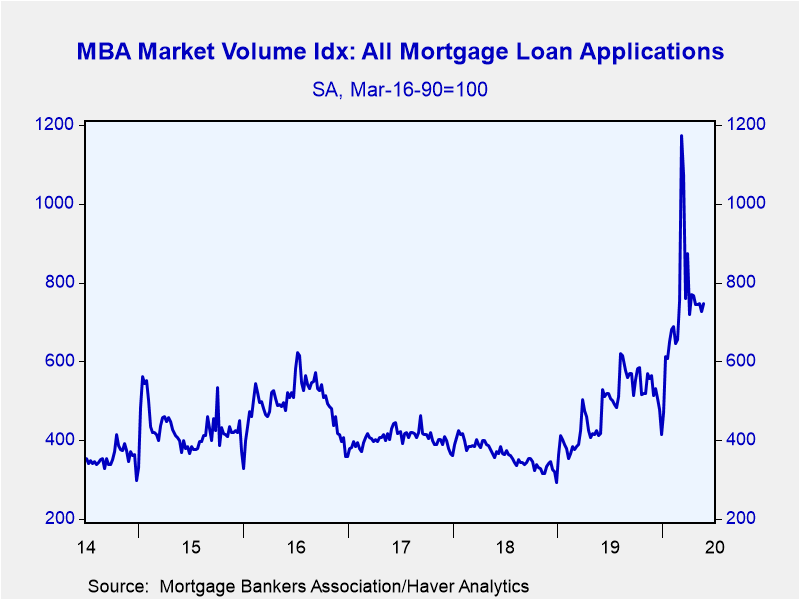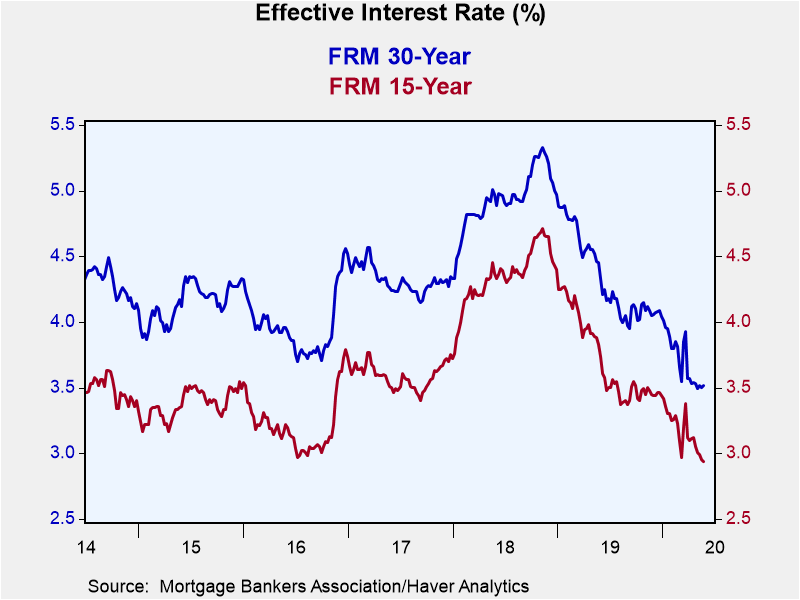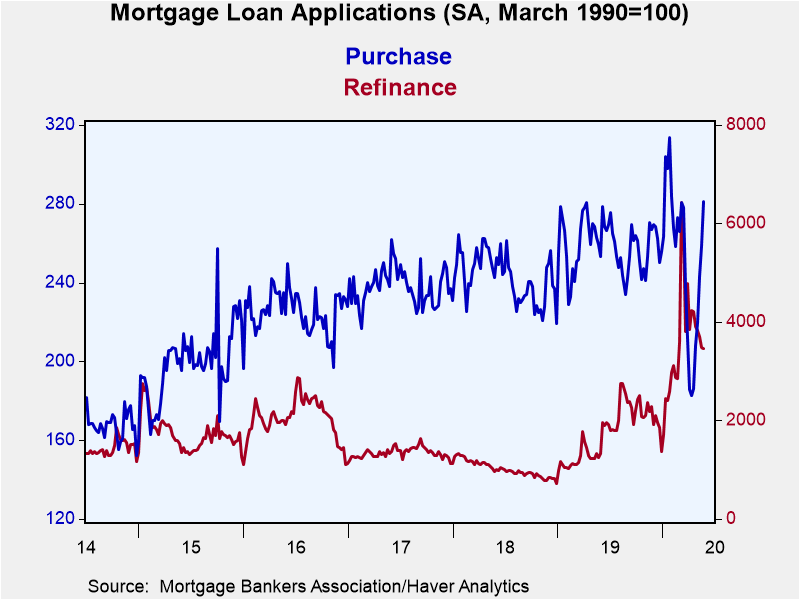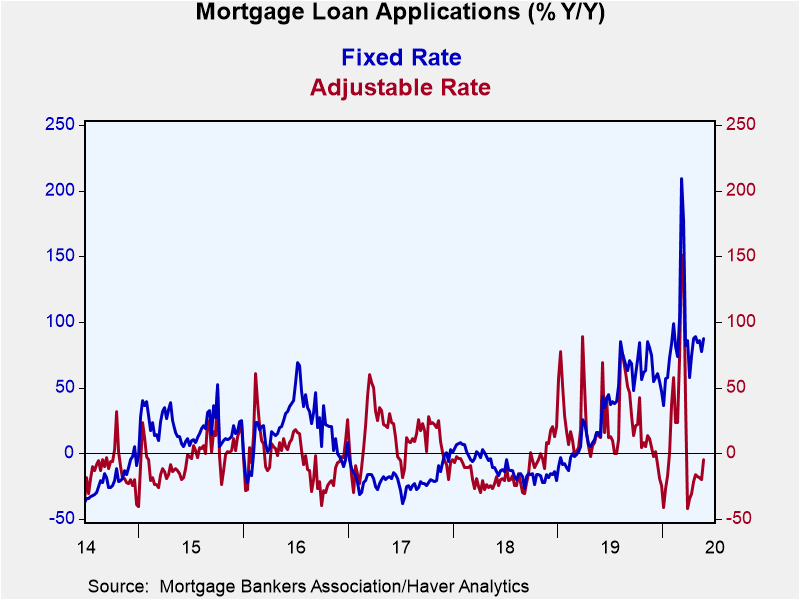 Global| May 27 2020
Global| May 27 2020U.S. Mortgage Applications Reveal Strength in Housing Demand
by:Tom Moeller
|in:Economy in Brief
Summary
• Purchase applications continue to rise. • Refinancings ease. The Mortgage Bankers Association reported that its Mortgage Loan Application Index rose 2.7% (75.1% y/y) last week and reversed the prior week's decline. Purchase [...]
• Purchase applications continue to rise.
• Refinancings ease.
The Mortgage Bankers Association reported that its Mortgage Loan Application Index rose 2.7% (75.1% y/y) last week and reversed the prior week's decline.
Purchase applications increased for the sixth straight week. The 8.6% gain (8.7% y/y) occurred as the economy began to open up after coronavirus shutdowns. Applications to refinance an existing mortgage eased slightly but still were up 176.1% from a year earlier.
The refinancing share of mortgage activity fell to 62.6% of total applications, down from 76.2% early last month. Just 3.4% of total loan volume were adjustable-rate mortgages.
The effective interest rate on a 15-year fixed-rate mortgage was fairly steady at 2.94% last week. This rate remained close to its all time low (dating back to 1990). The effective interest rate on a 30-year fixed-rate mortgage rose two basis points to 3.52% but remained down from a high of 3.93% in mid-March. The effective rate on a 30-year Jumbo mortgage also rose slightly to 3.79%. The rate on the 5-year adjustable rate mortgage fell to 3.09% from a high of 4.61% in October 2018.
The average mortgage loan size increased to $314,900 and reversed most of the declines during the prior two weeks. The average loan size for purchases jumped w/w to $340,200, the highest level in two months. The average loan size of refinancings was little changed w/w at $299,800 but compared to an early-March high of $372,100.
Home buyers and owners continue to lock in currently low levels of interest rates. Applications for fixed-rate loans increased 87.5% y/y, while applications for adjustable rate loans fell 5.0% y/y.
The survey covers over 75% of all U.S. retail residential mortgage applications and has been conducted weekly since 1990. Respondents include mortgage bankers, commercial banks and thrifts. The base period and value for each index is March 16, 1990=100. The figures for weekly mortgage applications and interest rates are available in Haver's SURVEYW database.
The Fed's latest Beige Book covering regional economic conditions can be found here.
| MBA Mortgage Applications (%, SA) | 05/22/20 | 05/15/20 | 05/08/20 | Y/Y | 2019 | 2018 | 2017 |
|---|---|---|---|---|---|---|---|
| Total Market Index | 2.7 | -2.6 | 0.3 | 75.1 | 32.4 | -10.4 | -17.8 |
| Purchase | 8.6 | 6.4 | 10.6 | 8.7 | 6.6 | 2.1 | 5.6 |
| Refinancing | -0.2 | -6.3 | -3.3 | 176.1 | 71.1 | -24.3 | -34.0 |
| 15-Year Effective Mortgage Interest Rate (%) | 2.94 | 2.95 | 2.99 | 3.88 | 3.71 | 4.35 | 3.59 |
| 30-Year Effective Mortgage Interest Rate (%) | 3.52 | 3.50 | 3.52 | 4.46 | 4.34 | 4.94 | 4.32 |
Tom Moeller
AuthorMore in Author Profile »Prior to joining Haver Analytics in 2000, Mr. Moeller worked as the Economist at Chancellor Capital Management from 1985 to 1999. There, he developed comprehensive economic forecasts and interpreted economic data for equity and fixed income portfolio managers. Also at Chancellor, Mr. Moeller worked as an equity analyst and was responsible for researching and rating companies in the economically sensitive automobile and housing industries for investment in Chancellor’s equity portfolio. Prior to joining Chancellor, Mr. Moeller was an Economist at Citibank from 1979 to 1984. He also analyzed pricing behavior in the metals industry for the Council on Wage and Price Stability in Washington, D.C. In 1999, Mr. Moeller received the award for most accurate forecast from the Forecasters' Club of New York. From 1990 to 1992 he was President of the New York Association for Business Economists. Mr. Moeller earned an M.B.A. in Finance from Fordham University, where he graduated in 1987. He holds a Bachelor of Arts in Economics from George Washington University.
More Economy in Brief
 Global| Feb 05 2026
Global| Feb 05 2026Charts of the Week: Balanced Policy, Resilient Data and AI Narratives
by:Andrew Cates










